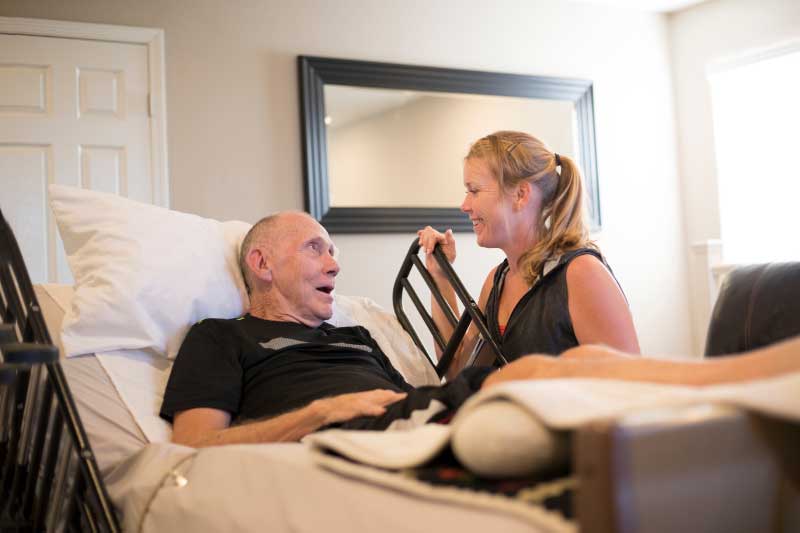Unlock empathy and knowledge with our in-depth, comprehensive guide to hospice care for elderly community and family caregivers.
Navigating the waters of elder care, particularly when it comes to serious illness, can be one of the most emotionally challenging tasks for both the patients and their caregivers. It requires a delicate balance of medical management and emotional support, all while ensuring the patient’s dignity and comfort are maintained.
Understanding Compassionate Care: A Comprehensive Guide to Hospice Care for Elderly Community and Family Caregivers
In these complex and sensitive times, hospice care can be a beacon, providing a tailored approach to support the patient and their loved ones.
Compassion in Palliative Care: What is Hospice?
At its core, hospice is a form of specialized care focused on providing support and comfort to individuals diagnosed with a terminal illness. It aims to enhance the patient’s quality of life and provide emotional, social, and spiritual support for the patient and their loved ones through the end-of-life phase.
Hospice care shifts the focus from curing the patient’s illness to managing symptoms and pain, with a heavy emphasis on providing compassionate, individualized care. This shift, while acknowledging the terminal nature of the patient’s illness, does not signify the abandonment of hope but rather a reorientation of what that hope looks like.
When is the Right Time for Hospice Care?
Recognizing the right moment to engage in hospice care can be a deeply personal and critical decision. Typically, it’s time to consider hospice when the patient’s physician estimates that they have six months or less to live, should the illness continue its normal course. However, specific diagnosis and prognosis can vary, and it’s important to involve medical professionals in this decision process.
Adopting hospice doesn’t mean the patient cannot leave the program if their health improves or if they choose to seek other treatments. It provides flexibility and a complete range of services designed to meet the unique needs of the patient and their family.
The Hospice Interdisciplinary Team
Hospice care is not a one-person show. It involves an interdisciplinary team working to manage the patient’s care. This team typically includes:
- 1. Hospice Physician: Oversight and patient care management.
- 2. Registered Nurse: A regular visitor who provides skilled care and coordinates services.
- 3. Home Health Aide: Assists with personal care, bathing, and grooming.
- 4. Social Worker: Provides emotional support and assistance with end-of-life planning.
- 5. Chaplain: Addresses spiritual and religious needs.
- 6. Volunteer: Offers companionship and support to both patient and family.
- 7. Bereavement Specialist: Provides support to the family before and after the patient’s passing.
By integrating these professionals, hospice care addresses the patient’s medical needs while considering the broader spectrum of emotional and spiritual needs.
The Role of Family Caregivers in Hospice
Families are instrumental in hospice care. They are the individuals most intimately involved with the patient’s day-to-day living. Their role extends from basic care assistance to providing emotional and spiritual comfort.
Caregiving Considerations
Family caregivers often find themselves in a new and sometimes challenging role. They must balance providing care with managing their well-being. This balance can be achieved by:
- Accepting Help: Caregivers need to accept assistance from the hospice team and other support systems.
- Communicating Openly: Regular and honest communication with the patient, hospice team, and other family members can help manage expectations and reduce stress.
- Educating Yourself: Learning about the patient’s condition and how to care for them can empower caregivers.
- Caring for Yourself: This includes addressing your physical, mental, and emotional health needs. Caregiver burnout is common and can be detrimental to the patient’s well-being.
Hospice Services: A Holistic Approach to Care
Hospice services are designed to address a comprehensive set of needs for the patient and their family. By offering a combination of medical, spiritual, and psychosocial support, hospice aims to care for the patient’s body, mind, and spirit.
Medical Services
A mainstay of hospice care is the management of the patient’s symptoms to ensure their comfort. This includes pain management, medical equipment and supplies, and any necessary medications related to their terminal illness.
Emotional and Psychosocial Care
The emotional and mental well-being of the patient and their family are paramount. Hospice offers counseling, support groups, and other resources to help cope with the stress of a terminal illness.
Spiritual Care
Addressing the patient’s spiritual needs is often integral to hospice care. The chaplain can provide religious rituals, prayer, or a listening ear to support patients and their families during this difficult time.
Volunteer Services
Volunteers are a valuable addition to the hospice team. They offer companionship and support by spending time with patients, reading to them, or simply being present and offering a listening ear.
Bereavement Support
Grief support is vital for families coping with the loss of a loved one. Hospice offers bereavement counseling and support groups for a period following the patient’s passing.
Making the Transition to Hospice Care
For many, the move to hospice care represents a profound transition. Families may experience a range of emotions, but it’s important to recognize that choosing hospice is not a giving up but a turning towards a new focus on comfort and dignity.
The First Steps
The process begins with a referral to a hospice program by the patient’s physician. Upon acceptance, the hospice team will meet with the patient and their family to discuss the care plan and its implementation.
Setting Realistic Expectations
The hospice team will provide a clear understanding of what to expect, including the services offered, the level of care, and how to utilize the resources available best.
Preparing for the Journey
Hospice is about preparing emotionally and practically for the patient’s end-of-life experience. This can involve conversations about the patient’s goals and completing advance directives.
End-of-Life Planning Through Hospice
End-of-life planning is an essential component of hospice care. It allows the patient to maintain a sense of control over their care and assures the family that the patient’s wishes will be honored.
Advanced Directives and Living Wills
These legal documents outline the medical treatments the patient does or does not want in various scenarios. They are an important part of end-of-life planning and should be revisited regularly.
The Hospice Plan of Care
The hospice team, along with the patient and their family, will create a plan of care that addresses the patient’s needs and goals for their end-of-life experience.
Emotional and Spiritual Support
Hospice offers emotional and spiritual care that can help the patient find peace and comfort in their final days.











